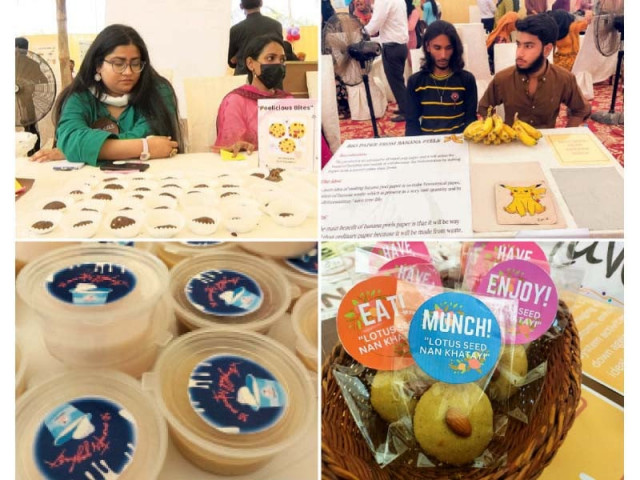Food science students cook up marvels
Prepare low-cost diet, paper from banana peel and biscuits from potato skin

Students from different educational institutions of the metropolitan city claim to have developed 'novel foods' that may help prevent psychotic disorders and reduce dependence on antipsychotics.
These 'ingenious foods' were put on display by students from various universities of Sindh at a food expo organized by the Department of Food Science & Technology at Karachi University. Representatives of industries took keen interest in the stalls and products displayed there.
The students claimed that the low-cost foods were developed using natural ingredients after comprehensive researches. These foods may not only be useful against Depression, Alzheimer's, and Iron Deficiency but may also help increase mental abilities, according to them.
Some students also developed food from waste of veggies. Maryam from Karachi University, who developed biscuits from potato peel, told The Express Tribune that this could avoid wastage of peel and minimize costs for commercial biscuits manufacturers. "A box of quality biscuits is selling for Rs120, but the one made from potato peel could cost as low as Rs.11 a box," she added.
Abdul Rafi, also from Karachi University, claims to have prepared paper from banana skin. "Generally, cellulose is used for paper making," he said, adding that banana skin contains 60% cellulose while wood has 45% cellulose.
Paper is made from wood, but trees play a vital role in environmental protection. "If we start making paper from banana peel, then felling of trees for paper making would stop which, in turn, would have a positive impact on environment," Rafi said. "The paper made from banana skin is better in quality besides being environment friendly."
As much as 170 million tons of bananas are produced globally every year, he said, adding that the peel of these bananas is trashed which also causes air and land pollution.
Bisma Khan, from Jinnah University, has developed pretzels from Bacopa monnieri, also known as brahmi herb, and fennel powder which, she claims, increases mental peace and mental strength.
Brahmi is believed to have medicinal value in treatment of Alzheimer's disease. "This biscuit could be included in diet by psychotic people to eliminate dependence on antipsychotics, while students could use it to improve strength of their mind," she added.
Jinnah Sindh Medical University students have developed a supplement using a mixture of sesame and fish oils which, they claim, eliminates depression without the use of anti-depressants. Hiba Sohail said that they have developed lactic acid from probiotic bacteria. "Probiotic bacteria have been used to preserve foods, such as bread, cheese, and yogurt, to reduce the cost of manufacturing the products made from them," she added.
Tuba from Hamdard University has prepared dairy and egg-free vegan cupcakes. "Lactose intolerant people can safely relish these cakes," she said, adding that this cake is a real treat for vegans.
Another student Maryam Hussain has prepared low-cost natural stearic acid from sugarcane pulp and apple waste. "If produced commercially, this stearic acid can help save millions of dollars spent on its import from China," she said. "Citric acid imported from China is available at Rs.600 per kg, but this locally produced acid would only cost Rs.200 per kg."
Samuel, from Karachi University, has developed "eco-friendly bio-plastic" from chicken feathers that dissolves in soil. "Chicken feathers pollute environment; therefore, we have developed bio-plastic by extracting keratin from chicken feather," he said. "This plastic does not break down in water, so food can easily be preserved in it."
Sidra Tariq has prepared egg-less naan khati using a gluten-free plant instead of flour. Sadia Sohail claims to have developed a technique to prepare yogurt within 30 minutes which is much cheaper than the curd available in the market. "The shelf-life of my yogurt is more than one month, while the commercially available curd cannot be stored for more than two weeks," she added.
Karachi University Vice Chancellor Dr. Khalid Mahmood Iraqi appreciated the students for their innovative products. "Only a degree is not enough in practical life, students should also get expertise in their respective fields," he said. "It is necessary to organise such programs, so that students get awareness about food," he added.
Published in The Express Tribune, October 21st, 2022.



















COMMENTS
Comments are moderated and generally will be posted if they are on-topic and not abusive.
For more information, please see our Comments FAQ